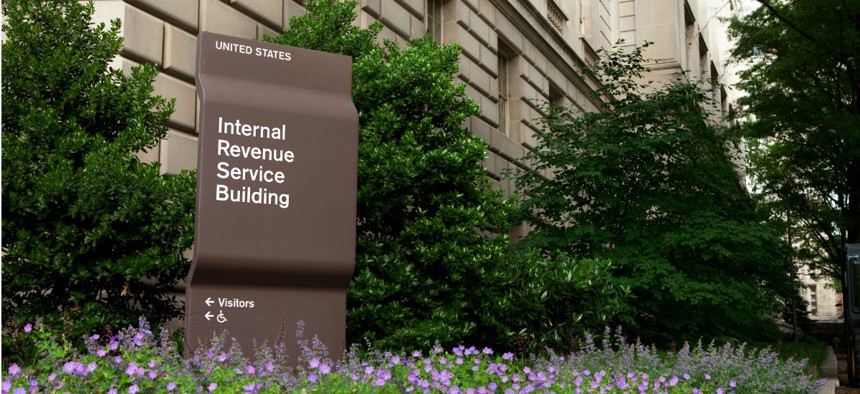
Mark Van Scyoc / Shutterstock.com
Taxpayer Advocate Again Pleads for Bigger IRS Budget to Boost Customer Service
Trump nominee for commissioner promises to "knock on doors" for more resources.
Despite a recent budget hike to implement the new tax law, the Internal Revenue Service “doesn’t have enough employees to answer the phones, to conduct outreach and education, or to provide basic taxpayer service,” the National Taxpayer Advocate said in her latest report.
The 2018 filing season—in which the tax agency processed 130.5 million returns, up 1.3 percent from the previous year—did bring a small decline in hold times for taxpayer calls, from 6.5 minutes in 2017 to 5.1 minutes in 2018, Nina Olson wrote in her summary. Agency staff answered 80 percent of the 42.5 million calls overall, a tad more than the 79 percent level last year. But on the special lines for strapped taxpayers calling to negotiate a special payment plan, the staff answered only 49 percent of calls, and taxpayers who got through waited an average of 28.7 minutes on hold.
“In addition to answering the fewest number of enterprisewide taxpayer calls in recent memory,” Olson wrote, “the IRS also has the lowest individual audit rate in memory (0.6 percent), and its collection actions are way down.”
The 70,000-employee agency—which has seen its budget and staff cut by some 20 percent in the past seven years—is ripe for customer service improvements of the type called for in the president’s management agenda, Olson wrote, particularly in the area of modernizing information technology. (Congress is considering new funding for such modernization as it mulls reforms to the agency.)
But “the current state of IRS customer experience lags far behind other government agencies,” the report declared. It cited two surveys showing that government services in general lag 9 percentage points behind the private sector’s. “The American Customer Satisfaction Index ranks the Treasury Department 12 out of 13 federal departments and says the Treasury Department’s score is effectively an IRS score because most citizens make use of Treasury services via the [IRS] tax-filing process,” the report said.
Secondly, the Forrester Federal Customer Experience Index “contains some particularly alarming findings regarding the IRS,” the report said. Though the IRS’s own reports show a customer satisfaction level of 90 percent, the 2018 Forrester report found that the private sector average score for Customer Experience is 69, and the federal average score is 59. “The IRS’s score is 54 out of 100, which is considered ‘very poor,’ ” Olson’s team found. “This places the IRS twelfth out of 15 rated agencies, behind the U.S. Postal Service, the Department of Veterans Affairs, the U.S. Citizenship and Immigration Services and the Social Security Administration.”
Finally, Olson continued her earlier condemnation of Congress’s policy requiring the IRS to pay commissions and use private debt collection contractors to go after long-delinquent tax debtors. She faulted the program both for spending more money than it collects and for unfairly intimidating low-income taxpayers. “According to the IRS, the [private debt collection] program generated net revenue in fiscal 2018 but has yet to break even,” she said in her June report. About 2 percent of the dollars assigned for collection have been collected thus far from the 304,444 taxpayers assigned to the contractors (with plans to assign 700,000- 800,000 debts in calendar year 2018).
The taxpayer advocate also said that “the IRS has refused to allow [taxpayer advocate service] representatives to participate in monitoring calls between [contractors] and taxpayers, despite congressional interest in this issue. Thus, we are not able to provide insight into why taxpayers agree to make payments they cannot afford.”
Charles Rettig, President Trump’s nominee to be the next internal revenue commissioner, during his Senate Finance Committee confirmation hearing Thursday hinted at a willingness to rethink implementation of private-debt collection policy. He told Sen. Ben Cardin, D-Md., that, if confirmed, he would work with Congress on that issue, as well as in reversing some of the larger budget cuts to the agency.
“If confirmed, one of my top priorities would be to analyze the budget,” Rettig told Sen. Tom Carper, D-Del., to see “if there is a need for additional resources, funding resources, and the possibility of additional [employees]. I’m a big believer in training the workforce so that they are the best on the planet.”
The nominee also promised to be an advocate for IRS professionals' resource needs. “The last thing people have characterized me as is shy,” he said. “So I will be knocking on every door possible if we make the determination we need something to accomplish the goals we’ve set.” The committee, he added, would hear from him directly.
Rettig also expressed approval of legislation that would set up a separate training division within IRS to protect its funding. And he supported “streamlined critical pay,” or select higher salaries that some in Congress and the agency argue are needed to attract top information technology talent.
Rettig promised “open communication from top to bottom.” He described the role of leadership as “facilitating the ability of the team to perform to its top capability.” He called himself “a pretty good people person, open to criticism and open to providing criticism as well.”
He told Sen. Pat Toomey, R-Pa., that if Congress reorganizes the IRS, he would be open to them giving the commissioner more powers to select a management team. “Career IRS workers are absolutely world-class,” he said, “but having a private sector experience and bringing that inside is critical.”
Under questioning from Sen. Sheldon Whitehouse, D-R.I., he said he had made no loyalty pledge to President Trump, adding, “I hope the American people and taxpayers see me as staunchly independent.”







